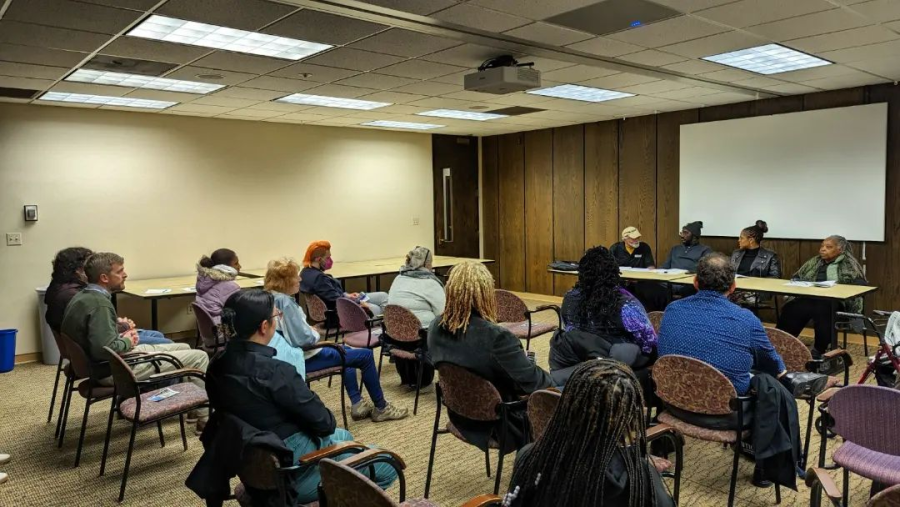Local NAACP chapter asks for more involvement at panel event
February 11, 2023
To kick off Black History Month, Utica University hosted local NAACP leaders during a panel on Jan. 30. The leaders included local president Freddie Hamilton and community leaders Edward Jackson and Craig Grant. Hilda M. Jordan moderated. The nonprofit’s goals were discussed along with the mission of growing youth involvement in the NAACP.
The event, which began with a moment of silence for Tyre Nichols, who was killed on Jan. 7 by five police officers from the Memphis Police Department, was attended by about 15 Utica faculty and staff members and no students.
Hamilton said her vision for the organization is to be more involved in local government to represent people in distress. She emphasized the importance of understanding history to increase political awareness in African American communities.
“You can not change the future if you do not understand history,” Hamilton said. “I would like us to be an organization that focuses on economic development and increases voter participation of people of color.”
Hamilton described information deserts in African American communities as barriers to those goals. Communities of color lack information, discouraging participation in local politics and economic advancement. Financial literacy, diversity and inclusion are vital in expanding the networks for people of color. Providing people with information is crucial so they can participate in decision-making at the workplace and local government levels.
The National Association for the Advancement of Colored People is a nonprofit organization that was founded in 1909 by Black and white activists to combat ongoing violence against African Americans. The NAACP went on to play a pivotal role in the Civil Rights movement in cases such as Brown v. Board of Education. Led by lobbyist Clarence M. Mitchell Jr., the organization helped advance not only integration of the armed forces in 1948 but also the Civil Rights Acts of 1957, 1964 and 1968 and the Voting Rights Act of 1965.
Kira Maddox, Communications and Engagement Coordinator for the office of Diversity, Equity and Inclusion & Student Transitions, said the DEI office wanted to awaken students to a historical organization at the forefront of change for people of color and members of African diaspora. It was important to dovetail it with Martin Luther King, Jr. legacy programming and Black History Month events.
“Listening to members of the Utica-Oneida County branch of the NAACP was a way for our University community to get a first-hand look at some of the current systemic issues Black and African Americans have to struggle with, even here in Central New York,” Maddox said. “Getting involved with community groups provides an opportunity to develop a more nuanced understanding of societal challenges—especially those faced by marginalized groups—cultivate leadership skills, and be a part of the solution as we strive for a more equal and equitable society at large.”
Community leaders such as Edward Jackson Sr, a Navy veteran who moved to Utica in 1984, joined the NAACP in 1985. The organization advocated for more black teachers and led an initiative to hire a black principal. African Americans did not have representation on the local school board or common council at the time. It was the job of the NAACP to advocate for people of color in the local community.
Craig Grant joined the NAACP at a young age as an entrepreneur in the property maintenance business. He is chair of the Black History Month Committee and the former first vice president. He has also been a 30-year member of the NAACP. He views the organization as a part of the checks and balances political system in which African Americans often lack political and legal representation.
When asked about his most significant accomplishments, Grant said “helping people retain jobs and seek higher quality jobs” would be high on his list. He has a passion for representing those facing discrimination in racial disputes in the workplace. Grant’s involvement in the organization as a youth helped him come up with the idea of merging local colleges to form an NAACP college chapter to increase youth involvement.
This idea of the college coalition forming the NAACP youth chapter received support from the likes of Dr. Clemmie Harris, professor of Africana Studies at Utica University. Harris encouraged establishing an ongoing relationship between Utica University and NAACP so students become more involved in the community initiatives occurring around them.
Jordan, who moderated the event, grew up in Utica and attended Thomas R. Proctor High School. Her early involvement in the NAACP helped mold her into the person she is today. She graduated as salutatorian of her senior class and then went on to graduate from Harvard University. Jordan has served as a workplace discrimination paralegal and founded the anti-racist social equity firm HMJ Consulting. She is excited to lead the recruitment of younger chapter members. Recruitment has not occurred since 2019.
NAACP is seeking students to help solve the issue of the information desert that the Utica community faces. She said the NAACP needs participants familiar with social media management, website building and data management. Students familiar with sociology research would also be helpful. For more information or to get involved, email [email protected].




































































































































